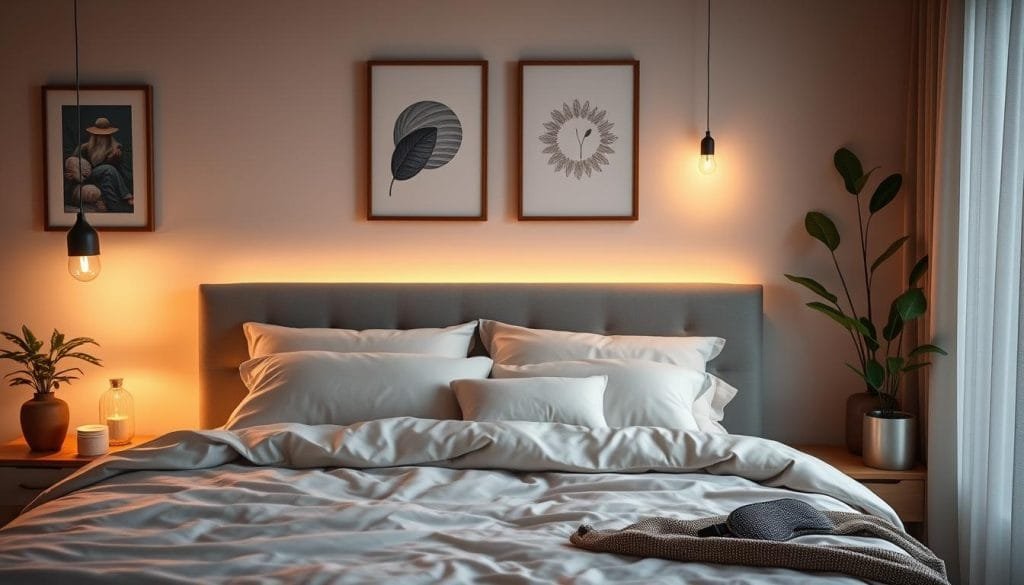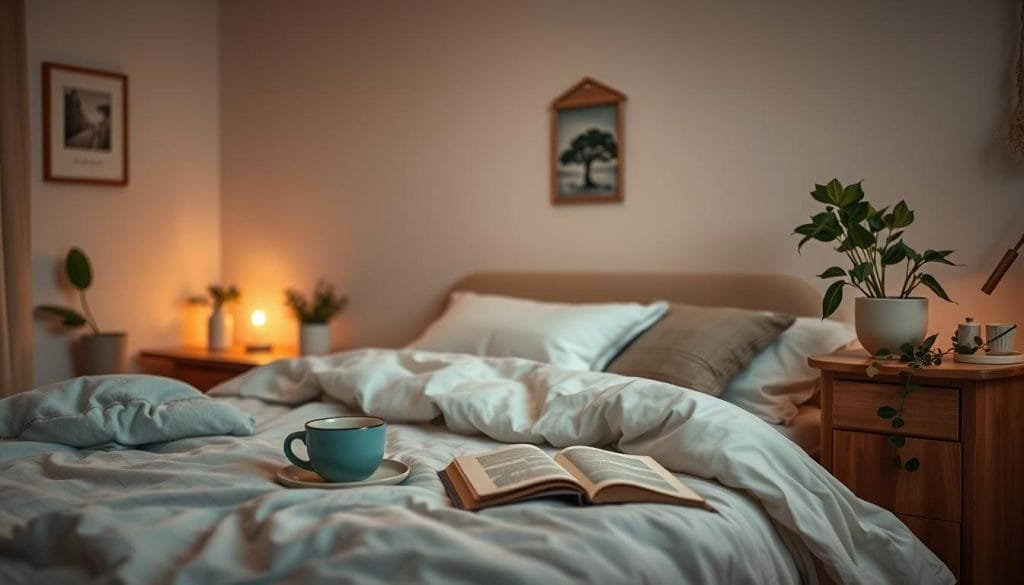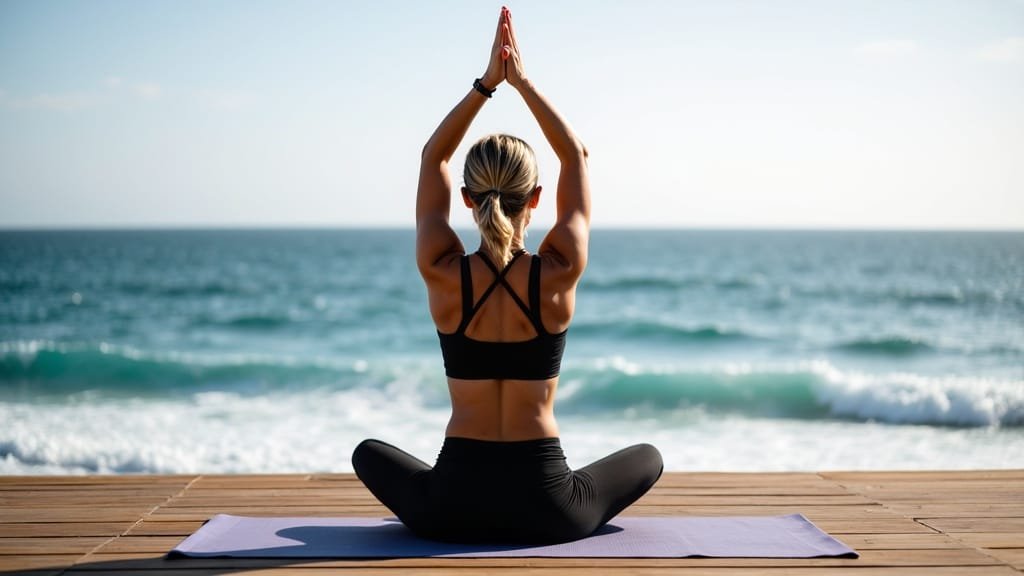We’ll look at the top 5 tips to help you sleep better tonight. These include making your sleep space calm and starting a soothing bedtime routine. These steps will boost your sleep quality and make you feel refreshed.
If you find it hard to fall or stay asleep, or just want to sleep better, this guide is for you.
Key Takeaways
- Discover the importance of quality sleep for overall health and well-being
- Learn how to create a relaxing sleep environment to promote better sleep
- Establish a consistent sleep routine and wind-down ritual for improved rest
- Optimize your bedroom for better sleep by adjusting temperature, lighting, and bedding
- Incorporate relaxation techniques, such as deep breathing and meditation, to enhance sleep quality
Understanding the Importance of Quality Sleep
Quality sleep is key for our health and happiness. Our bodies and minds rest and repair during sleep. This is crucial for our physical, mental, and emotional health. We’ll look at how sleep keeps us healthy and what happens when we don’t sleep well.
The Role of Sleep in Overall Health and Well-being
Sleep is vital for our health and happiness. It helps our bodies fix damaged cells and strengthen our immune system. It also helps us remember things better and keeps our hormones in balance.
Good sleep improves our thinking, boosts our immune system, and lowers the risk of serious diseases. These include heart disease, diabetes, and obesity.
Consequences of Poor Sleep Patterns
Poor sleep can harm our health and happiness. Not enough or bad sleep can make us less sharp, forgetful, and less creative. It can also weaken our immune system, making us more likely to get sick.
Long-term sleep problems can lead to serious health issues. These include heart disease, diabetes, obesity, depression, anxiety, and a weakened immune system.
Knowing how important good sleep is, we can work on bettering our sleep habits. This can improve our health and overall well-being.
Create a Relaxing Sleep Environment
To get better sleep, it’s crucial to create a relaxing and conducive sleep environment in your bedroom. Here are some key factors to consider when optimizing your space for restful sleep:
Temperature and Lighting
The ideal bedroom temperature for quality sleep is typically between 65°F and 70°F (18°C to 21°C). Keeping the room cool and dark can help promote better sleep. Avoid bright lights and use dimmer switches or blackout curtains to minimize light exposure before bedtime.
Noise and Distractions
Minimize noise and distractions in your sleep environment. Consider using a white noise machine or earplugs to block out external sounds that can disrupt your sleep. Avoid having televisions, computers, or other electronic devices in the bedroom, as the blue light from these screens can interfere with your body’s natural sleep-wake cycle.
Comfortable Bedding
Invest in a high-quality mattress, pillows, and bedding that provide optimal comfort and support. Look for breathable, natural fibers like cotton or linen to help regulate your body temperature during the night. Replace old or worn-out bedding to ensure you’re sleeping on a surface that promotes better better sleep.
By creating a relaxing and distraction-free sleep environment, you can set the stage for a more restful sleep and a healthier nighttime routine. Remember, small changes to your bedroom can have a significant impact on the quality of your sleep.
| Factor | Optimal Range |
|---|---|
| Temperature | 65°F to 70°F (18°C to 21°C) |
| Lighting | Dim or dark |
| Noise | Minimal to no distractions |
| Bedding | Comfortable, breathable, and supportive |
Establish a Consistent Sleep Routine
Creating a consistent nighttime routine can greatly improve your sleep. It helps your body get into a regular rhythm. This way, you can enjoy a better night’s sleep.
Winding Down Before Bedtime
Start winding down before bed with relaxing activities. Try light reading, gentle stretching, or a warm bath. These signals to your body that it’s time to sleep.
Avoid activities that can keep you awake. This means no TV or social media before bed. They can make it hard to fall asleep.
Sticking to a Regular Sleep Schedule
- Go to bed and wake up at the same time every day. This helps your body’s natural rhythms. It leads to better sleep.
- If you can’t sleep, get up and do something calm. This helps you feel sleepy again.
- It might take time to get into a regular sleep schedule. But the benefits are worth it. You’ll feel more alert and energized during the day.
By following a consistent nighttime routine, you’ll sleep better. You’ll wake up feeling refreshed and ready for the day. Sweet dreams!
“The secret of your future is hidden in your daily routine.” – Mike Murdock
Optimize Your Bedroom for Better Sleep
Creating a sleep-friendly environment is key for better sleep. We’ll look at important factors for a restful bedroom.
Ideal Room Temperature and Lighting
The best sleep temperature is between 65°F and 70°F (18°C and 21°C). A cool room helps your body sleep better. Also, avoid bright lights, especially from screens, to help you sleep.
Choosing the Right Mattress and Pillows
The right mattress and pillows are crucial for sleep. Find a mattress that fits your body and sleeping style. A good mattress helps you sleep deeper and feel better. Choosing the right pillows is also important for neck and spine support.
| Mattress Characteristics | Pillow Characteristics |
|---|---|
|
|
Optimizing your bedroom can greatly improve your sleep. Focus on temperature, lighting, and the right mattress and pillows. These changes can significantly improve your sleep and overall well-being.

Practice Relaxation Techniques
Getting better, more restful sleep isn’t just about the right sleep environment or a consistent routine. It’s also about using relaxation techniques. These can calm your mind and body, getting you ready for a good night’s sleep. We’ll look at deep breathing and mindfulness/meditation.
Deep Breathing Exercises
Deep breathing is a great way to relax before bed. It lowers your heart rate and muscle tension. It also helps you focus on the present, not worries.
Try this simple technique:
- Sit or lie in a comfy position.
- Inhale slowly through your nose, feeling your belly expand.
- Hold the breath for a few seconds.
- Exhale slowly through your mouth, letting your belly relax.
- Repeat this for 5-10 minutes before bed.
Mindfulness and Meditation
Mindfulness and meditation are also great for better sleep. They help you focus on the present and calm your mind. Try a simple mindfulness exercise:
- Find a quiet, comfy place to sit.
- Close your eyes and focus on your breathing.
- Notice the air moving in and out of your body.
- When your mind wanders, gently bring it back to your breath.
- Practice this for 5-10 minutes before bed.
Adding relaxation techniques to your healthy sleep habits can help you relax and reduce stress. This can lead to a more restful night’s sleep. Try them out and see how they can improve your sleep.
Avoid Sleep Disruptors
To get better sleep, we need to find and remove things that mess with our sleep. We’ll look at common sleep disruptors and share tips to reduce their effect on your sleep.
Bright Lights and Electronics
Devices like phones and computers give off blue light. This light can make our brains think it’s still day, stopping melatonin production. To avoid this, turn off devices an hour before bed and keep your room dark.
Caffeine and Stimulants
Caffeine and other stimulants can make it hard to fall and stay asleep. Try to cut down on these, especially in the evening.
Inconsistent Sleep Schedules
Going to bed late on weekends can mess with your sleep rhythm. Try to sleep at the same time every day, even on weekends, for better sleep.
Stress and Anxiety
Stress and worries can keep you awake. Use techniques like meditation or deep breathing to calm down before bed.
By tackling these sleep disruptors, you can improve your sleep and overall health. A good sleep environment and healthy habits are key to enjoying quality rest.
| Sleep Disruptor | Impact on Sleep | Recommended Solution |
|---|---|---|
| Bright Lights and Electronics | Suppresses melatonin production, making it harder to fall asleep | Avoid electronic devices and maintain a dark bedroom environment before bedtime |
| Caffeine and Stimulants | Interferes with the ability to fall asleep and stay asleep | Limit consumption of caffeine and other stimulants, especially in the afternoon and evening |
| Inconsistent Sleep Schedules | Disrupts the body’s natural circadian rhythm, making it harder to fall asleep at the desired bedtime | Maintain a consistent sleep schedule, even on weekends |
| Stress and Anxiety | Makes it challenging to relax and fall asleep | Practice stress-management techniques, such as meditation or deep breathing, before bedtime |
Exercise Regularly for Better Sleep Quality
Getting better sleep is not just about a cozy bed or a set bedtime. Exercise plays a big role too. We’ll look at how exercise can help you sleep better. We’ll also give tips on how to fit it into your day for better sleep.
The Benefits of Physical Activity for Sleep
Many studies show that exercise boosts sleep quality. Here are the main benefits:
- Faster sleep onset: Exercise helps you fall asleep quicker, cutting down on the time it takes to sleep.
- Deeper sleep: It increases time in deep, restorative sleep stages, leading to better sleep quality.
- Reduced sleep disturbances: Regular exercise cuts down on nighttime wake-ups, helping you sleep better all night.
- Improved sleep efficiency: Exercise makes your sleep more efficient, ensuring you get the most from your bed time.
Adding exercise to your daily routine can greatly improve your sleep. It’s a key part of healthy sleep habits and better sleep quality.
“Exercise is one of the most powerful tools we have to improve sleep quality and duration. Engaging in regular physical activity can have a transformative effect on your sleep patterns and overall well-being.”
Limit Caffeine and Alcohol Intake
Getting quality sleep is key for our health and happiness. But, caffeine and alcohol can mess with our sleep. Knowing how they affect sleep helps us make better choices for a good night’s rest.
The Impact of Caffeine and Alcohol on Sleep
Caffeine is a stimulant that keeps us awake. It blocks adenosine, a chemical that makes us sleepy. Drinking caffeine before bed can make sleep restless and less deep.
Alcohol might make us sleepy at first, but it messes with our sleep later. It can cut down on REM sleep, which is important for our brains and feelings.
Tips for Limiting Caffeine and Alcohol Intake
- Avoid caffeine in the afternoon and evening to avoid sleep trouble.
- Drink less alcohol, especially before bed, to keep your sleep good.
- Try cutting down on caffeine and alcohol to see how it helps your sleep.
- Drink lots of water to fight off dehydration from caffeine and alcohol.
Knowing how caffeine and alcohol affect our sleep lets us make better choices. This supports our health and happiness.

Develop a Calming Nighttime Routine
Creating a calming nighttime routine is key for better sleep. By doing relaxing activities before bed, we tell our body and mind it’s time to sleep. Here are some tips to make your nighttime routine more restful sleep friendly.
Unwind with a Relaxing Activity
Begin your routine with something calming. This could be reading, taking a warm bath, or listening to soft music. Stay away from screens and intense TV to keep your sleep cycle natural.
Limit Screen Time
Electronic devices like phones and computers can mess with your sleep. Try to avoid them for at least an hour before bed. This helps make your sleep environment more sleep-friendly.
Establish a Consistent Bedtime
Going to bed and waking up at the same time every day is important. It helps your body get into a sleep rhythm. Stick to a schedule to keep your body’s natural clock in sync.
Engage in Light Stretching or Meditation
Adding light stretching or meditation to your routine can be great. These activities calm your mind and body, getting you ready for sleep.
By adding these elements to your nighttime routine, you can make a calming ritual. It helps you sleep better and feel better overall. Try different activities to find what works best for you and get the better sleep you need.
Conclusion
By following the expert tips in this article, we can greatly improve our sleep. This leads to waking up feeling refreshed and ready to go. Getting good sleep is key to our health and happiness. So, let’s start using these tips tonight for better sleep.
Creating a calm sleep space and sticking to a bedtime routine are key. This guide offers a full plan for better sleep. By making our bedrooms sleep-friendly and avoiding things that disrupt sleep, we can have a great night’s rest.
Improving our sleep might take some trial and error. But with effort and a desire to change, we can enjoy the benefits of good sleep. Let’s apply these tips and wake up feeling full of energy and ready for the day.



